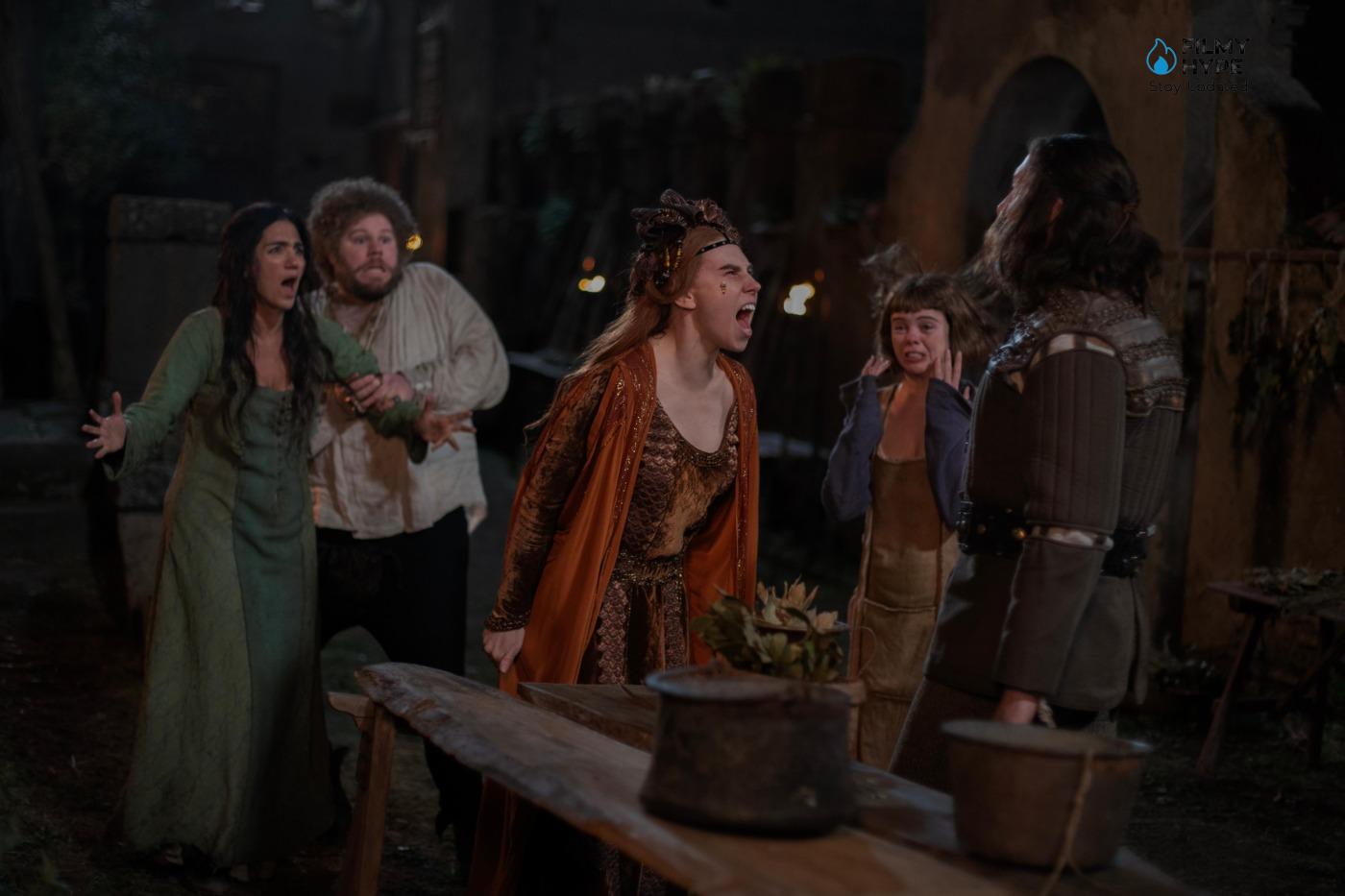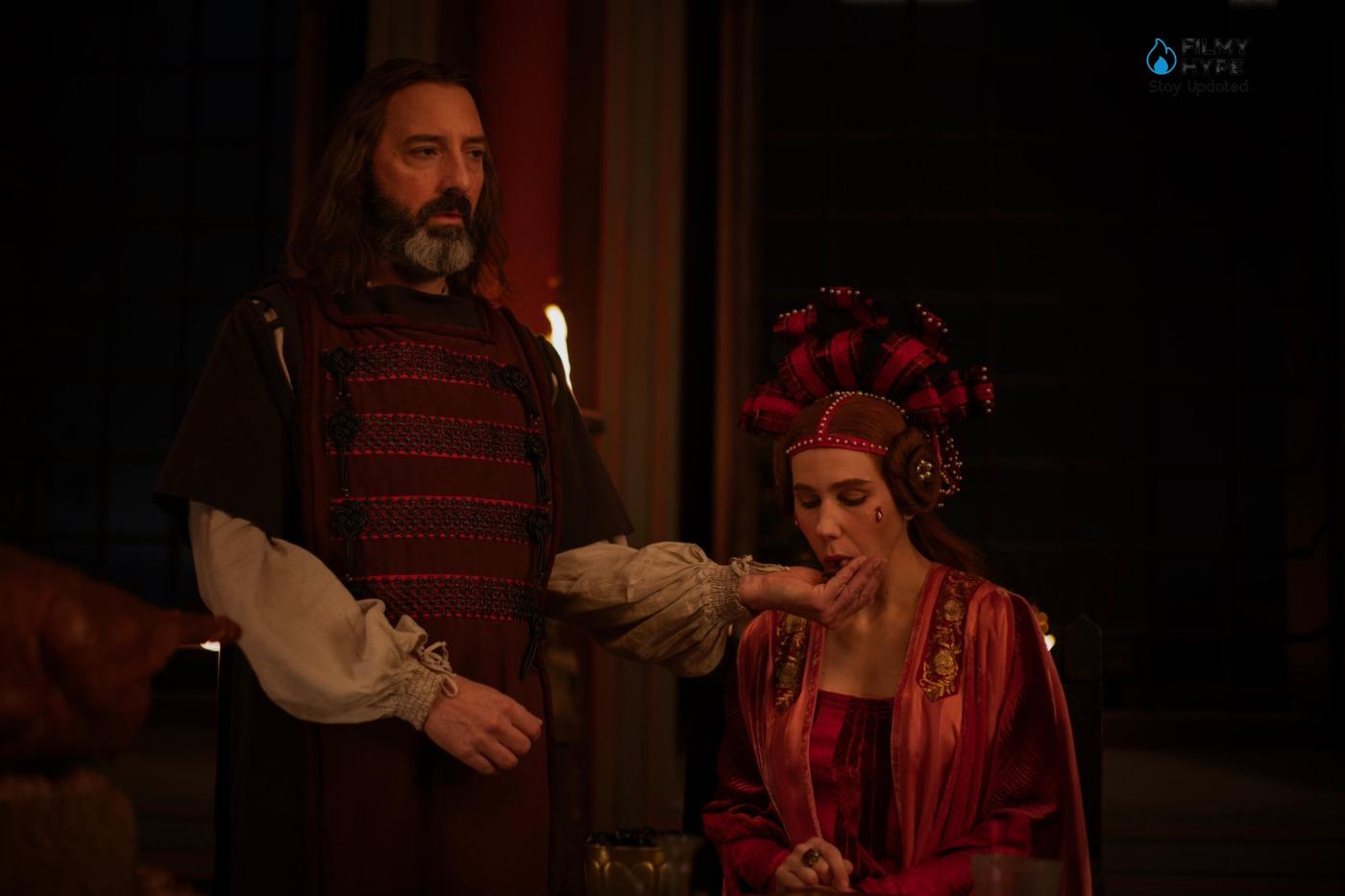The Decameron Ending Explained: Who Survives and Who Keeps the Villa?
The Decameron Ending Explained: The Decameron has been available on Netflix since July 25, 2024. This is an 8-episode black comedy miniseries, far from Giovanni Boccaccio’s The Decameron. Directed by Michael Uppendahl, the plot is set in the mid-fourteenth century and is inspired, albeit remotely, by the collection of Italian stories from the Italian literary Middle Ages. It all begins with the spread of the bubonic plague in Italy. Here, a group of noble people retreat to a villa with their servants, to save themselves. But this escape immediately turns into chaos. Inspired by Giovanni Boccaccio’s collection of short stories, The Decameron is a medieval Netflix black comedy set in Florence in 1348, during the Black Death epidemic. The series created by Kathleen Jordan follows a group of nobles and their servants who take refuge in the grand Villa Santa to escape the disease.

Although the invitation comes from Viscount Leonardo, he doesn’t show up at the property. What happened to him? How does chaos take over the majestic villa? Here’s what happened to the protagonists. Among the guests of honor are Leonardo’s fiancée Pampinea (Zosia Mamet) and her loyal maid Misia (Saoirse-Monica Jackson); Panfilo (Karan Gill) and his pious wife Neifile (Lou Gala); Tindaro (Douggie McMeekin) and his physician Dioneo (Amar Chadha-Patel); and his cousin Filomena (Jessica Plummer), accompanied by her servant Licisca (Tanya Reynolds). They are greeted by the butler Sirisco (Tony Hale), and the cook Stratilia (Leila Farzad). Each of the characters in The Decameron has secrets and hidden plans. Starting with the host, who fell ill and died. Sirisco tries to hide the Viscount’s death, but Misia soon discovers it. Because she carried the body of her sick partner, she decided not to expose it. However, Pampinea insists on seeing her fiancé and is determined to go find him, so they have no choice but to tell her the truth.
The Decameron: Summary Recap
The series will focus on the short stories collected in Boccaccio’s Decameron, transporting us to 14th-century Florence, as Florence faces the Black Death epidemic. A group of seven girls and three boys, who escape it, take refuge in a villa in the Tuscan countryside to isolate themselves, spending their time having fun and telling each other stories. The duration of their isolation will last exactly as the title suggests, derived from the Greek “[work] of ten days”, while the merry band of young people will take turns telling each other ten stories, often humorous in tone and with references to the bucolic eroticism of the time. Boccaccio’s book created a scandal in its time, and the series inspired by it seems to aim to do the same, even if it probably does not follow the events of Giovanni Boccaccio’s Decameron exactly and faithfully.
The Decameron Ending Explained: Who Survives and Who Keeps the Villa?
Upon returning to Villa Santa, Pampinea announces to the other guests that she has married Leonardo and later reveals that she is pregnant. At first, Sirisco supports her because he is in love and thinks that the child the noblewoman is expecting is his; however, he discovers her deceptions and allies himself with Panfilo to prevent that woman from taking over the property. On the way to the villa, Filomena and Licisca have a heated argument that ends with the servant pushing the noblewoman into the water. Believing her to be dead, Licisca takes her dress and pretends to be Filomena, who appears at the castle a few days later and tries to regain her place. She does not have the support of the others, so she takes refuge in Misia.

As the story progresses, it is revealed that Filomena and Licisca are sisters. Furthermore, the latter discovers that Filomena lied to her when she told her that her father had died just so as not to delay her trip to Villa Santa. Meanwhile, Panfilo and Sirisco invited Leonardo’s cousin Ruggiero, not imagining the trouble he and his gang would cause. Amid the chaos, Sirisco reveals the truth about the Viscount and Licisca confesses that she switched places with Filomena, prompting Ruggiero to kick them out of the property. When Neifile decides to stay by the man’s side, her husband Panfilo finally opens his eyes.
How Does The Decameron End: Who Survives and Who Dies?
In the finale of The Decameron the only survivors among those present at Villa Santaare Licisca, Misia, Filomena, Stratilia, Jacopo (secret son of Stratilia and Leonardo), and Sirisco. In the last episode, the mercenaries attack the gate of the villa to take possession of it. Meanwhile, Tindaro is in love with Stratilia and takes care of Jacopo as if he were his son. Panfilo suffers after the death of Neifile, who died of the plague. Tindaro and Panfilo eventually sacrifice themselves and die attacked by the mercenaries (the first stabbed and the other with arrows). Meanwhile, Misia locks Pampinea in a barrel and sets her on fire, while Licisca leaves the cellar to save Filomena. During the series, in addition to Neifile, Dioneo also dies of the plague. In the end, only the servants survive, except Filomena, who in the first three episodes works as a servant even though she is a noblewoman.
Who Has Villa Santa Left?
During the series The Decameron on Netflix, many characters try to take over Villa Santawhen it turns out that Leonardo is dead. Ruggiero and Filomena are the ones who most claim to have it, as they are cousins of the deceased. The latter, however, never tries to claim the villa. Even Panfilo, as a distant cousin, should have a right to the estate. But none of these characters turns out to be the true heir. In reality, the one to inherit Villa Santa should be Jacopo, son of Stratilia and Leonardo. In the Middle Ages, however, children born out of wedlock could not inherit their parents’ assets. In the end, the only one who seems to be the best heir is Sirisco, but the mercenaries are ready to conquer the villa.
Final Comparison with Boccaccio’s Book?
In a few details, the ending of The Decameron is inspired by the book of the same name by Giovanni Boccaccio. The miniseries draws inspiration from the story, quite loosely, with the nobles and their servants going to a villa outside Florence to save themselves from the Black Death. Even some of the characters’ names are the same. But these are the few things that directly connect the book and the TV series. After escaping from Villa Santa, the survivors lie down near a cave and tell stories to each other. Unlike the book, there are six people instead of ten. Despite everything, the last moments of the TV series bring the atmosphere presented in the book back to the small screen, between the mourning to be faced and the deaths of the characters, with survivors who still find a way to celebrate life.





